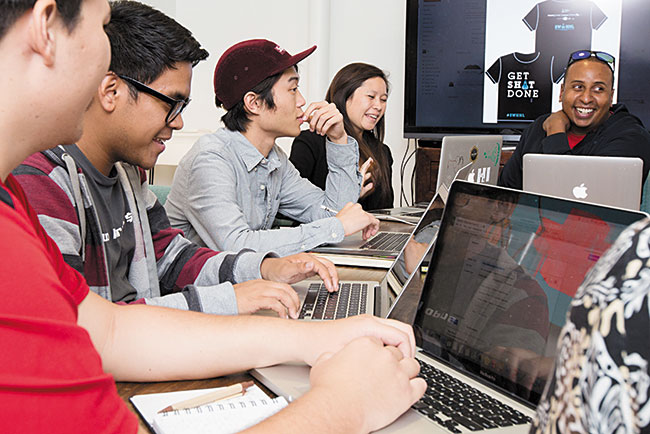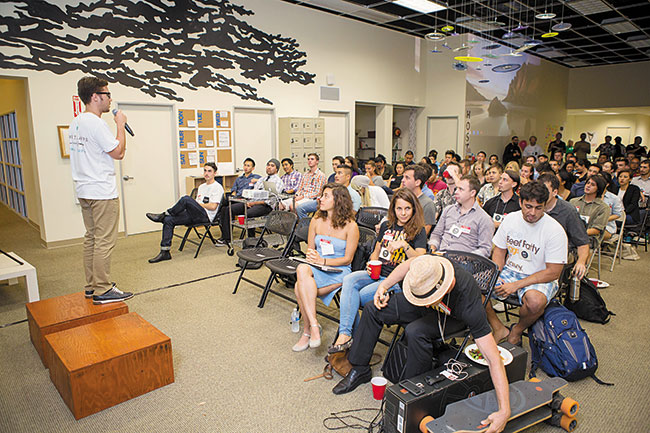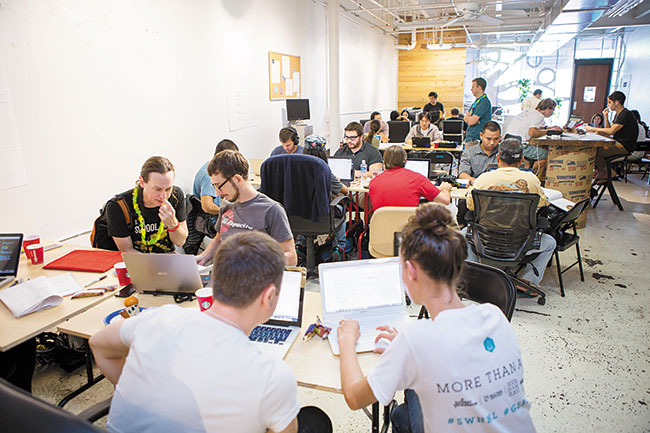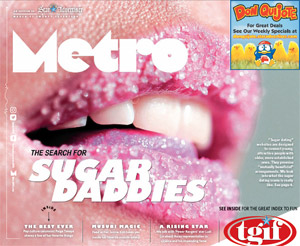54 Hours
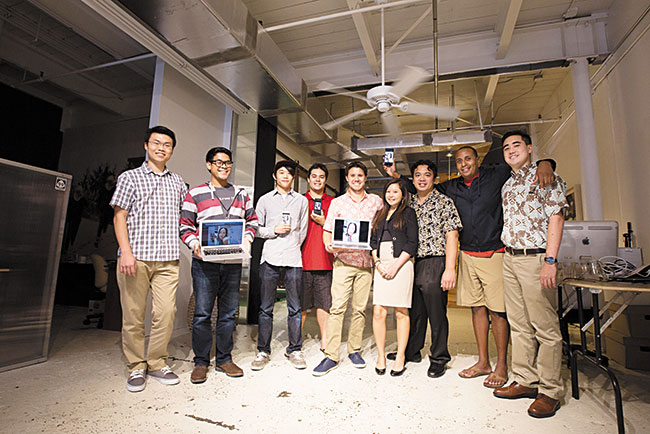
The Startup Weekend Honolulu organizing committee (from left): Kenneth Huang, Matthew Tengasantos, Jan Kwan, Kurt Cullen, Bryan Butteling, Jessica Ching, Richard Tran, J.D. Hayes and Bricen McCartney
After launching in March, event invite app Hobnob already has been garnering some big attention, getting featured in TechCrunch and trending on Product Hunt. The app, which was created by three local entrepreneurs, Tina Fitch and husband and wife Mark and Tiffany Quezada, offers easy-to-manage mobile-based invites with a chic, modern design. While Fitch is an experienced entrepreneur who had founded successful startups before, the Quezadas had had no prior experience in launching their own business.
That is, until one weekend in 2012. Mark, who at the time was working as a web developer, and Tiffany, then a nonprofit event manager, often had casually tossed ideas for businesses or apps back and forth. When Mark suggested that they attend Startup Weekend Honolulu (SWHNL), Tiffany was skeptical (“I didn’t get the concept of wanting to work for 54 hours on the weekend,” she admits), but they both ended up loving it.
They pitched an idea for a curated gift service called Minded. And while they didn’t win, the experience did set off a trajectory that eventually led them to create Hobnob.
“An idea is important, but if you can’t execute it, it doesn’t matter. Startup Weekend is focused on executing,” Tiffany says.
“Startup Weekend gave us the confidence we needed to take the plunge and become full-time entrepreneurs,” Mark says. “We had discussed building our own products many times before, but Startup Weekend was the catalyst to put real action behind those ideas. It gave us a reason, some structure and a timeline. That’s what we needed. After that, we just couldn’t stop.”
Startup Weekends are weekend-long, hands-on experiences that provide an opportunity for participants to turn their business idea into reality. Based in Seattle, Startup Weekend has events all over the world and was launched locally by real estate agent Danielle Sherman in 2011. SWHNL now is held twice a year, with the next one taking place June 19-21 at Kakaako coworking spaces ProtoHUB and BoxJelly.
“It’s the norm nowadays for our generation to go to college, and then after college to get a good job, and work 9 to 5 and stick to your skill-set,” says Bryan Butteling, who is part of the SWHNL organizing committee and a former winner. “And there is nothing wrong with that. But through SWHNL, it kind of says, ‘Hey, don’t forget that you can do whatever you want to do.’” It kicks off Friday night, when everyone has a chance to pitch their idea to the crowd. Then, teams are formed around the most popular pitches, and they’ve got the rest of the weekend to conduct market research, test the business model, formulate a revenue and growth model, and build a prototype. On Sunday evening, teams present their findings and product to a panel of judges.
That’s a lot to do over the course of just one weekend — and as Butteling says, there’s a good reason for that: That breakneck pace is indicative of working for a startup.
“Most people think it’s all glamour — startups have been the buzzword now for years,” Butteling says. “You look at companies like Airbnb and Uber, and you’re hearing buyouts and merging and all this money being thrown around. But the reality is, it’s killer. It’s 24/7. It becomes your life, and Startup Weekend introduces that.
“But Sunday night, after everything is done, there’s that moment when nobody wants to leave — people are just staying and talking because they are so pumped about the experience,” he adds. “They don’t want the weekend to end.”
According to Startup Weekend, more than 36 percent of its startups are still in operation three months after the event. Perhaps more significant, 80 percent of participants plan to continue working with their team after the weekend. That’s in line with what Butteling has seen locally — people may attend a couple of SWHNL events, but then they move on, either taking what they have done to start a company, or finding partners to collaborate with on another project.
From the six Startup Weekends that have been held in Honolulu, eight companies have launched. Perhaps the largest commercial success has been Tealet, a website that connects tea farmers directly to consumers.
And, for participants like Mark and Tiffany who don’t end up pursuing their Startup Weekend project further, the event often leads to other entrepreneurial ventures.
During one SWHNL, Chad Kahunahana pitched a winning idea: Green Apple, which helps teachers save money on school supplies. The judges liked it so much that a partner at a prominent Bay Area accelerator encouraged him to join the program. He deferred, though, to focus on another project he had in the works: Experience Hawaii, an online marketplace for tourism activities.
“It’s a great learning experience,” Kahunahana says. “Startup Weekend is all about learning, trying out new things, meeting new people and just thinking of crazy ideas.”
While startups often are connoted with tech, that’s by no means a requirement for SWHNL, and the crowd is diverse. It attracts everyone from business executives to high school students, along with coders, and SWHNL has found that about half of participants are from tech industries, while the other half are not.
For Butteling, Startup Weekend also was his introduction into entrepreneurship. After college, Butteling worked for a few years in hotel management. But he always had been interested in entrepreneurship, and in 2012, he pitched his idea — Fan Addicts, which connected sports fans with bars showing the games they want to see — and won. From there, he worked on a couple other startups, helped bolster BoxJelly’s development, and now does strategic partnerships at startup consulting firm Sultan Ventures.
“As chaotic as my life is, I love what I do,” Butteling says. “And I want to be able to share that experience with other people. I have a lot of friends when you ask them how they have been, they say, ‘Same thing, different day.’” What I want to do is show people there are other options out there.”
One thing that SWHNL veterans have found particularly encouraging is that the number of participants — as well as the quality of pitches — have increased over the years. The real value in building up an entrepreneurial ecosystem, perhaps, hinges on something larger.
It could, Butteling feels, help address all kinds of problems that the state faces. “(Entrepreneurs) look at problems and they don’t go and ask someone else to solve it for them, they get out there and they do it,” Butteling says. “If you get enough critical mass all thinking about these problems, someone is bound to solve it.”
Startup Weekend Honolulu returns June 19-21 (Friday-Sunday), with registration beginning at 6 p.m. that Friday at ProtoHUB. Throughout the weekend, work space will be available at BoxJelly, with final presentations held at ProtoHUB. Tickets cost $75. For more information and to register, visit honolulu. up.co. SWHNL also is seeking volunteers to help organize the event. For participants looking for an extra edge, Bryan Butteling of Sultan Ventures leads a pitch prep session at 6 p.m. June 11 at Sultan Ventures. SWHNL also can be found on Facebook at facebook.com/swhnl, and on Twitter @swhnl.

